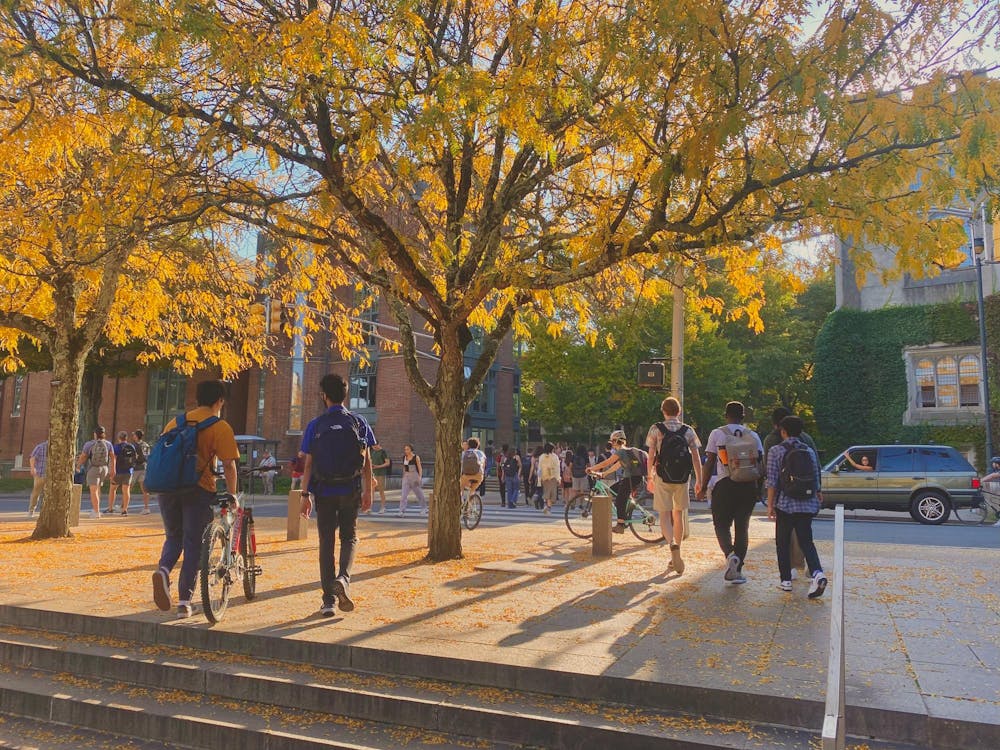The University is in the process of a major academic change, the transition from certificates to minors. At a meeting with the Undergraduate Student Government (USG) Academics Committee on Sept. 29, representatives of the Office of the Dean of the College (ODOC) indicated that further changes may be coming. The group discussed initiatives to extend the passing time between classes from 10 to 20 minutes and extend the due dates of papers into finals period.
According to the senior associate dean of the college and director of the McGraw Center for Teaching and Learning Kate Stanton, the Registrar's Office prepared two models that would extend passing time to either 15 or 20 minutes.
The proposal to extend passing time was motivated by the expansion of the University's physical campus, according to Stanton. The proposals also come amidst a recent ban on personal electric vehicles, which some students argue “slow commute speeds.”
USG Academics Chair Srista Tripathi ’25 wrote to the Daily Princetonian that “as the campus continues to expand, it becomes more difficult for students to travel between classes, extracurriculars, and other activities within the allocated 10 minutes. This is especially true for injured students, students with a disability, or students who are partaking in interdisciplinary courses which may take place all around campus.”
An additional motivation for the schedule remodeling is that many classes are compressed into the 10 a.m. and 11 a.m. class time slots, leaving the first morning time slot underutilized, according to Stanton.
A ‘Prince’ data analysis found that 365 class sections start at 11 a.m., 237 class sections start at 10 a.m., while 117 started at 9 a.m.
In an email to the ‘Prince,’ Stanton clarified that “extending passing time would not affect the length of classes. Both models start the teaching day later and preserve the 4:30pm-7:30pm ‘blackout’ period.”
In an effort to get student opinions on the matter, the Academics Committee plans to send out a university-wide survey for students to share their perspectives on both the 15– and 20–minute plans. The Diversity, Equity, and Inclusion (DEI) Committee was also consulted to discuss which plan offers a more equitable and inclusive option for all students.
Tripathi wrote, “Implementing a longer passing time would give students time to have breaks for meals, prayer, or other needs, allowing for a more sustainable schedule than what many students have now.”
According to Tripathi, the Academics Committee currently shows a majority preference for the 20–minute model. The Faculty Committee on Classrooms and Schedule is reviewing the two models and will recommend one to the full faculty, who will eventually vote to approve the new model, according to Stanton. If approved, the earliest a new model would be implemented would be the Fall 2025 semester.
At the Academic Committee meeting, ODOC staff, including Dean Cecily Swanson, Dean Claire Fowler, and Dean Katherine Stanton, as well as the University Registrar, Emily Shandley, also proposed an initiative to create a staggered deadline schedule for final assignments.
Currently, Dean’s Date serves as both a deadline for end-of-term written assignments and is the last day in which term-time work can be submitted from the semester. Under the new model, Dean’s Date would no longer function as a deadline for end-of-term written assignments. Instead, “assessment deadlines would be staggered during the finals period,” Tripathi shared.

According to Tripathi, “the goal of this proposal is to allow for a more balanced final assessment period, where students do not have a large number of assignments clustered at certain points based on whether their final assignments are mostly exams or mostly papers.”
Furthermore, according to Tripathi, in the proposed model, students will be able to see final assessment dates when selecting courses, allowing students to better structure their final assessment schedule and plan their travel plans earlier in the semester.
The Academics Committee will meet with two faculty committees, the Committee on Examinations and Standing and the Committee on Calendar and Scheduling, to further discuss this proposal and possible changes as needed. According to Senior Associate Dean of the College Claire Fowler, this proposal is in its early stages of discussion and therefore has no timeline.
The Academics Committee is currently working with ODOC to develop both of these proposals.
Tripathi wrote, “The academics committee feels very positive about [both] proposals, however, it hopes to be able to gain more student perspectives through survey and focus group initiatives prior to having these proposals implemented.”
Hannah Gabelnick is a News contributor for the ‘Prince.’
Please send corrections to corrections[at]dailyprincetonian.com.








